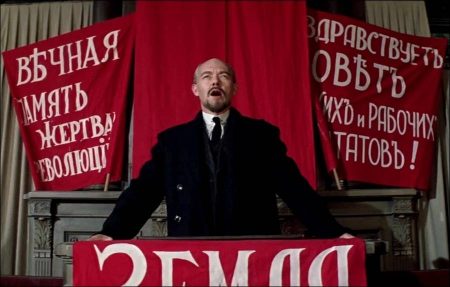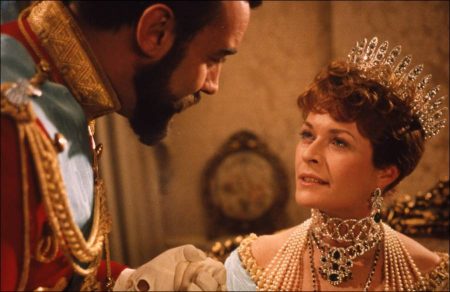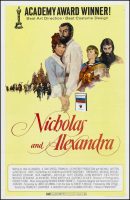Taglines: …is the story of the love that changed the world forever!
Nicholas and Alexandra opens in 1904 with Alexei’s birth during the Russo-Japanese War. Tsar Nicholas II is warned by his cousin Grand Duke Nicholas and the Prime Minister Count Sergei Witte that the war is futile and costing too many lives. They also tell him there is a rising demand by the Russian people for representative government, health care, voting, and workers’ rights, but Nicholas wants to maintain the autocracy. Meanwhile, underground political parties led by Vladimir Lenin, Joseph Stalin and Leon Trotsky have formed.
Alexei, the only son of Nicholas II and heir apparent to the throne, is diagnosed with hemophilia, a life-threatening disease. The Tsarina Alexandra, a German princess, is disliked by the Russian imperial court. In 1905, Alexandra befriends Grigori Rasputin, a Siberian peasant passing as a holy man, hoping he will heal Alexei.
That same year, factory workers are encouraged by Father Georgy Gapon to take part in a peaceful procession to the Winter Palace to present a petition to the Tsar. However, hundreds of soldiers standing in front of the palace fire into the crowd. Nicholas hears of this, the Bloody Sunday massacre, and while he is horrified by the violence, admits he would never have granted the people’s requests.
In 1913 the family holidays at the Livadia Palace in the Crimea. Prime Minister Pyotr Stolypin has preserved the Russian Empire by addressing some of the people’s grievances. He presents Nicholas with police reports about Rasputin’s dissolute behaviour, which is damaging the Tsar’s reputation. Nicholas dismisses Rasputin from the court. Alexandra demands his return, as she believes only Rasputin can stop the bleeding attacks, but Nicholas stands firm.
The 1913 Romanov Tercentenary celebrations occur and a lavish Royal Tour across Imperial Russia ensues, but crowds are thin. Other national festivities and Church celebrations go ahead, but at an event at the Kiev Opera House, Prime Minister Stolypin is assassinated. Nicholas executes the assassins and closes the Duma, allowing police to terrorize many peasants.
Alexei falls at the Spała Hunting Lodge, which leads to another bleeding attack. It is presumed he will die. The Tsarina writes to Rasputin, who responds with words of comfort. Alexei recovers and Rasputin returns.
When World War I begins, Nicholas orders a full mobilization of the Imperial Russian Army on the German border, prompting Germany to declare war and activate a series of its alliances that escalates the war. In 1915, with the war going badly for Russia, he decides to take personal command of the troops and leaves for the front, taking over from his experienced cousin, Grand Duke Nicholas.
Alexandra is left in charge at home and, under Rasputin’s influence, makes poor decisions. Nicholas is visited by his mother Dowager Empress Feodorovna, who is critical of his incompetence. She scolds him about neglecting domestic issues and implores him to eliminate Rasputin and send Alexandra to Livadia in the Crimea. Concerned about Rasputin’s influence, Grand Duke Dmitri and Prince Felix Yusupov invite Rasputin to a party in December 1916 and eventually murder him despite several unsuccessful attempts.
Even with Rasputin dead, Alexandra continues her misrule. The army is ill supplied, and starving and freezing workers revolt in St. Petersburg in March 1917. Nicholas decides to return to Tsarskoye Selo too late and is forced to abdicate in his train.
Nicholas and Alexandra is a 1971 British biographical film directed by Franklin J. Schaffner and written by James Goldman, based on Robert K. Massie’s 1967 book of the same name, which is a partial account of the last ruling Russian monarch, Tsar Nicholas II of Russia, and his wife, Tsarina Alexandra. It stars Michael Jayston and Janet Suzman, with a number of major actors in supporting roles.
Awards
The film won Academy Awards for Best Art Direction-Set Decoration (Art Direction: John Box, Ernest Archer, Jack Maxsted and Gil Parrondo; Set Decoration: Vernon Dixon) and Best Costume Design (Yvonne Blake and Antonio Castillo). It was nominated for Best Actress in a Leading Role (Janet Suzman), Best Cinematography, Best Music, Original Dramatic Score and Best Picture.
Nicholas and Alexandra was nominated for three Golden Globes including Best Supporting Actor and Most Promising Newcomer for Baker and Most Promising Newcomer for Suzman.
The film received three nominations from BAFTA including Most Promising Newcomer for Janet Suzman, Best Art Direction and Best Costume Design.
Nicholas and Alexandra was recognised by the National Board of Review as one of the Top 10 Films of 1972.
The score by Richard Rodney Bennett was nominated for a Grammy.
The film was nominated for six Academy Awards: Best Picture, Best Actress, Best Cinematography, Best Original Score, Best Costume Design and Best Art Direction, and won two, Best Costume Design and Best Art Direction.
Nicholas and Alexandra (1971)
Directed by: Franklin J. Schaffner
Starring: Laurence Olivier, Michael Jayston, Janet Suzman, Tom Baker, Michael Redgrave, Jack Hawkins, Harry Andrews, Roderic Noble, Ania Marson, Lynne Frederick, Guy Rolfe, John Wood
Screenplay by: James Goldman
Production Design by: John Box
Cinematography by: Freddie Young
Film Editing by: Ernest Walter
Costume Design by: Yvonne Blake
Set Decoration by: Emilio Ardura
Art Direction by: Ernest Archer, Jack Maxsted, Gil Parrondo
Music by: Richard Rodney Bennett
MPAA Rating: None.
Distributed by: Columbia Pictures
Release Date: December 13, 1971
Views: 212


